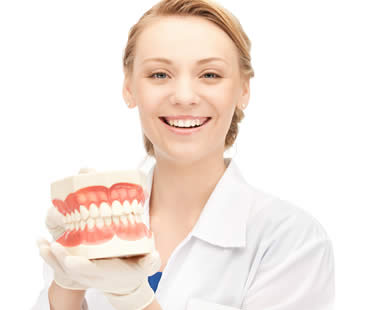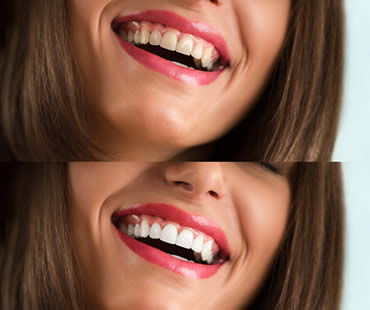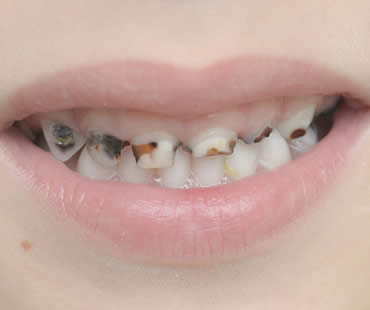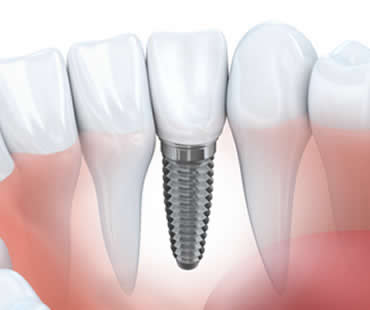
Everyone hopes to look younger and more attractive, and one way to achieve that youthful glow is to have a beautiful smile. Teeth free of stains, chips, misalignment, cracks and other problems are more likely to help you feel good about yourself and make a better impression on others. One way to achieve this goal is to see a cosmetic dentist for a smile makeover.
Dentists have been helping patients improve the appearance of their smiles for many years, but advances in techniques and materials allow smile makeovers to be much more advantageous today. Silver fillings have been replaced with tooth-colored composite resin, dental implants securely replace missing teeth, teeth whitening methods produce dramatic results, and computer imaging can provide great predictions for the outcomes of various cosmetic dental procedures.
There are many options for a smile makeover depending on what you need:
- Discolored or stained teeth benefit from professional whitening treatment. Yellowed teeth can improve numerous shades of white to give you a whole new look.
- Chips in your teeth can be filled with tooth-colored composite resin in a procedure called bonding. You can choose a shade closely matching your tooth, so that once it is smoothed and polished you can’t even tell it was done.
- Uneven teeth that are slightly longer or shorter than their neighbors can be shaped in a more appealing way using recontouring techniques.
- Gaps between teeth can be closed using composite material, or large spaces can be hidden with dental veneers. In fact, porcelain veneers can cover all sorts of flaws that you don’t want others to see in your smile.
- Cavities or cracked teeth can be filled with tooth-colored material instead of traditional amalgam, making them invisible in the mouth.
- Broken teeth that are unsightly or weak can be covered with a durable and attractive crown.
Crooked teeth can be moved with orthodontic treatment, employing the latest method of Invisalign. These clear plastic aligners transform your smile without the noticeable metal braces that impact your diet and dental hygiene.
If you live in the Meriden area contact us today

If your teeth are badly damaged from decay or facial trauma, or if you have several missing teeth, your dentist may recommend removable prosthodontics to solve your dental problems. Periodontitis (advanced gum disease), bone loss or serious tooth decay can leave you as a poor candidate for restorative options such as dental crowns, dental bridges or dental implants. Removable prosthodontics can restore your smile so that it looks and functions as it should and can restore your confidence as you eat, smile and laugh.
Just hearing the word “dentures” might give you pause, reminding you of your older relatives, but achievements in dental restorative therapies enable your dentist to craft a removable prosthodontic for you that will not only look, but will feel like your natural smile.
Removable prosthodontics include:
- Partial dentures correct gaps when only a few of your natural teeth are missing. A partial denture may be the best choice if your remaining teeth aren’t strong enough to support a dental bridge.
- Overdentures provide restorations when one or more of your natural teeth are in place in an arch – typically two teeth for a bottom overdenture and four teeth for an upper overdenture.
- Immediate dentures are put in place following an extraction, allowing the bone and gums to recover following an extraction procedure. They prevent the adjacent teeth from collapsing upon the empty space and affecting your bite.
- Complete dentures are for edentulous patients (patients with no teeth at all) and are designed to replace all of the teeth in one or both arches of your mouth, restoring your smile and your ability to eat and speak clearly.
Because of advancements in materials and techniques, many dentures can be mistaken for natural teeth. Only you – and your prosthodontist – will know your secret. Talk to your prosthodontist today to see what removable prosthodontics can do for you. Don’t wait to begin enjoying your life with your new, healthy smile.
We look forward to seeing you in our Meriden dental office

While life can be full of moments that are wonderful, there are days that just naturally stand out: your wedding, your graduation, a very special anniversary or birthday, or a big job interview you’ve always wanted. Many of these events are photographed, and when you look back at those photos in years to come, you naturally want to look your very best. Will you look back on your photos and wonder, could my teeth have looked better? The answer could be yes if your teeth aren’t the best and the brightest they can be.
Teeth are covered in enamel, a strong white coating on top of the internal structures of your tooth. As we age, enamel naturally wears away. Because it cannot be replaced naturally, the enamel thins, and the yellow layer of dentin beneath is exposed. This leads to smiles that are discolored and yellowed, appearing dingy and dim.
The foods we eat affect the brightness of our teeth, and some can begin to stain long-term. Beets, blueberries and blackberries can leave stains, as can tea, coffee, dark soda and red wine. Even soy sauce and balsamic vinegar can discolor your smile. If you have any crown, bridges or veneers, those structures aren’t affected by long-term stains, and can begin to stand out in unattractive contrast to your natural, darkening teeth.
Begin the process for your important day by scheduling an appointment with your dentist. Have your teeth examined and cleaned, and learn what teeth whitening procedures would best benefit your particular smile needs. Don’t wait until the last minute, as some whitening procedures take time to reach optimal effects. Some whitening methods increase the sensitivity of your teeth or surrounding gums. Planning ahead can allow your teeth some time to recover prior to your special event.
After your professional teeth whitening, you’ll be surprised at your self-confidence. Your mood will improve as you face those around you with your best and brightest smile, and everyone you meet will sense it. Love the photos you’ll be taking for years to come, and talk to your dentist today.
We look forward to seeing you in our Meriden dental office

Gone are the days when chewing gum is considered poor etiquette. In today’s society, you can find people chewing gum in business meetings, church, and just about every other situation. With gum chewing so prevalent, you may have wondered what it’s doing to people’s teeth. You may be surprised to learn that research shows that chewing sugarless gum has a number of dental benefits. Let’s see how it can actually be a helpful addition to your oral care routine.
Saliva flow
Chewing sugarless gum increases the flow of saliva in your mouth, which rinses away food particles. Saliva also neutralizes acids that result from bacteria in your mouth that can lead to tooth decay. Known to carry with it calcium and phosphate, increased saliva flow also helps strengthen your tooth enamel.
ADA acceptance
Choose gum with the American Dental Association (ADA) Seal, indicating it as met the required safety and effectiveness criteria. This approval means that you can trust the gum’s packaging and labeling to be true.
Sugarless
The only gums carrying the ADA Seal are sugarless. They contain sweeteners that don’t cause cavities, like aspartame, mannitol, sorbitol, or xylitol. Chewing gum with xylitol is especially recommended, because it has been shown to combat tooth decay and cavities.
Dental hygiene
Even though chewing gum can be beneficial, remember that brushing and flossing are still the best ways to care for your teeth. Brush twice a day with fluoride toothpaste, and floss every day to remove plaque and debris between your teeth. Between these dental hygiene tasks, however, it is acceptable to chew sugarless gum to continue caring for your mouth during the day.
If you live in the Meriden area contact us today

Once you’re an adult, you don’t have to worry about cavities anymore. Right? Wrong! It’s true that you should have mastered oral hygiene techniques, but there are different factors that can contribute to cavities that weren’t a big issue during childhood. What are some of the things that put you at risk for cavities once you’ve reached adulthood, and what can you do about them?
Diet
Often your diet is worse as an adult without even realizing it, and what you eat and drink directly affects your teeth and gums. Sugar is the biggest offender and all types of sugar counts, not just the obvious candy or sodas. Limit your consumption of juices, milk, crackers, sweetened coffee, fruits, and vitamin or energy drinks.
Grazing
Many people tend to “graze” on foods and drinks all day long. If you snack frequently, you’re giving bacteria a constant supply of sugars to mix with and damage your mouth. Even though it’s tempting to sip on coffee or soda all morning, it’s better to drink it in one sitting. Also consider using a straw to avoid your teeth completely.
Receding gums
If your gums pull away from your teeth, your tooth roots can be exposed to plaque. Older patients with gingivitis, or gum disease, are more likely to form cavities. If the roots of your teeth are uncovered, you are more susceptible to plaque buildup and tooth decay.
Previous fillings
Fillings you received earlier in life can contribute to adult cavities. The filling may weaken with time, allowing bacteria into any cracks. Your dentist will check existing fillings for wear and replace them if needed.
Medical conditions
People with lower saliva flow due to various illnesses are at higher risk of cavities. Cancer patients who have undergone chemotherapy or radiation are at more risk, as are smokers. People with limited manual dexterity may be unable to clean their teeth sufficiently.
Ways to decrease your risk
Brush with a fluoride toothpaste after meals, floss daily, and rinse with a fluoride mouthwash. See your dentist twice a year, and also inquire about fluoride treatments.
If you need a dentist in Meriden contact us today

Dental implants are the best restorative choice for replacing a tooth that is missing. Whether the tooth has come out due to some kind of facial trauma or an infection or other issue, dental implants are the solution. The real difference in quality between a dental implant and other restorations such as bridges lies in the fact that the dental implant is placed directly into the patient’s jawbone, eventually fusing there through a process known as ossification.
Over time, ossification provides the kind of tooth base that is only seen elsewhere in natural teeth. When a dental implant is successful, it is as secure and as natural looking as a patient’s own original teeth; however, in some cases, dental implants fail. Sometimes they fail repeatedly. What’s causing these dental implant failures? Here are some potential causes.
Sometimes the implant doesn’t fuse with the bone and the bone shrinks away from the implant, leading to implant mobility or even the implant falling out. Patients who have weak bones due to age, osteoporosis, years of being edentulous (toothless) or another medical condition will find dental implants more challenging. If you’ve been having issues with failure to ossify, your dentist might recommend a bone graft to rebuild the jawbone to a healthy level so that dental implants can properly fuse.
In other cases, persistent infection may result in repeated implant failure. Signs of infection are continuous bleeding, swelling at the implant site or acute inflammation of the gum tissue at the implant site. Pus may be evident, or a bubble might appear on the gumline. Some health issues such as diabetes, auto-immune disorders or treatments like cancer therapies can weaken the immune system and leave the implant site vulnerable to infection. Your dentist might prescribe antibiotics or recommend you see an endodontist for a root canal treatment.
If you’re concerned about your dental implant, talk to Meriden dentist Dr. Hergott right away. Find out what steps you need to take to ensure that your dental implants are successful.
If you need a dentist in Meriden contact us today














